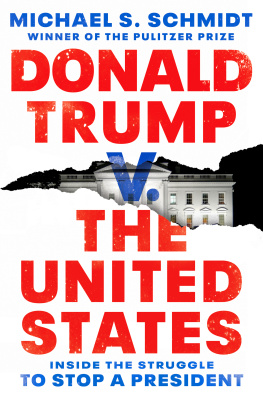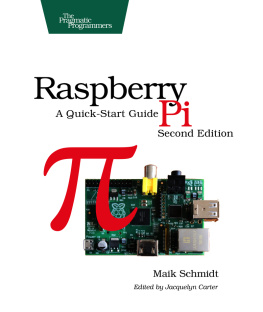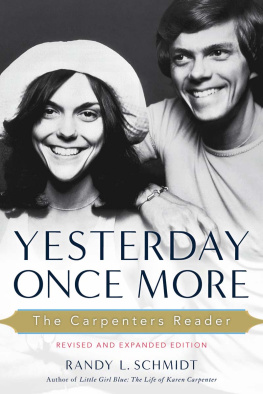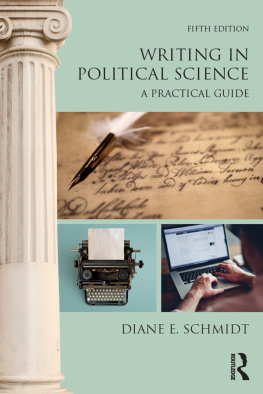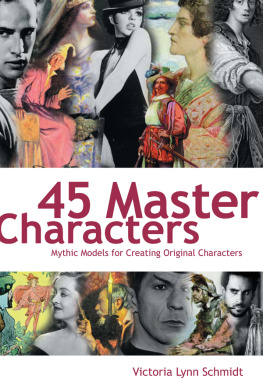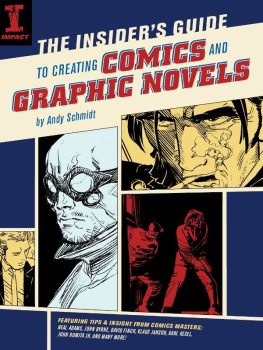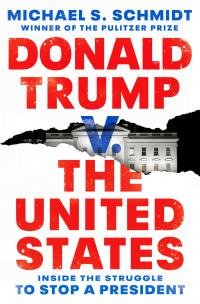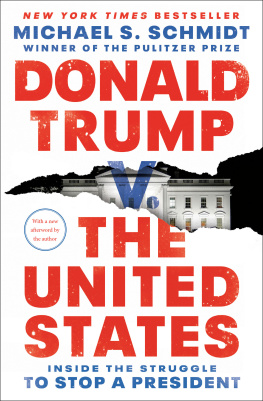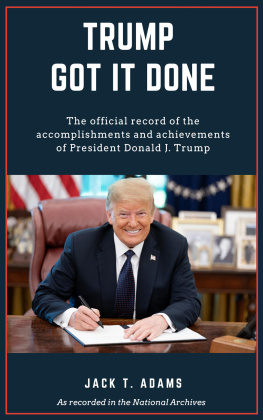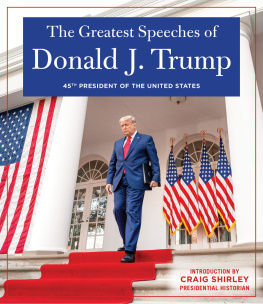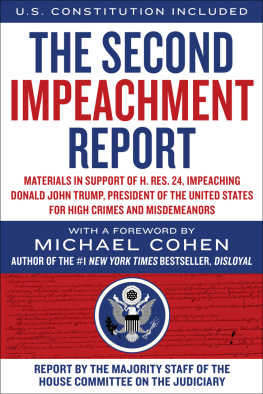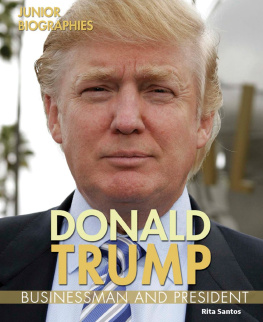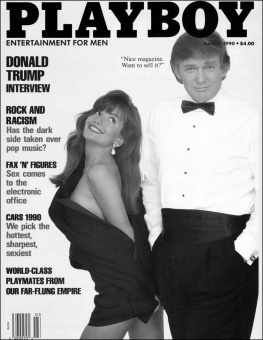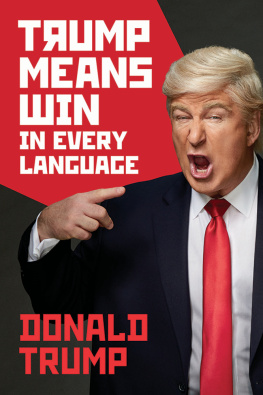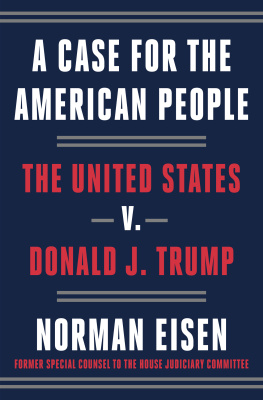Schmidt - Donald Trump v. The United States: Inside the Struggle to Stop a President
Here you can read online Schmidt - Donald Trump v. The United States: Inside the Struggle to Stop a President full text of the book (entire story) in english for free. Download pdf and epub, get meaning, cover and reviews about this ebook. year: 2020, publisher: Random House Digital, genre: Politics. Description of the work, (preface) as well as reviews are available. Best literature library LitArk.com created for fans of good reading and offers a wide selection of genres:
Romance novel
Science fiction
Adventure
Detective
Science
History
Home and family
Prose
Art
Politics
Computer
Non-fiction
Religion
Business
Children
Humor
Choose a favorite category and find really read worthwhile books. Enjoy immersion in the world of imagination, feel the emotions of the characters or learn something new for yourself, make an fascinating discovery.
Donald Trump v. The United States: Inside the Struggle to Stop a President: summary, description and annotation
We offer to read an annotation, description, summary or preface (depends on what the author of the book "Donald Trump v. The United States: Inside the Struggle to Stop a President" wrote himself). If you haven't found the necessary information about the book — write in the comments, we will try to find it.
Schmidt: author's other books
Who wrote Donald Trump v. The United States: Inside the Struggle to Stop a President? Find out the surname, the name of the author of the book and a list of all author's works by series.
Donald Trump v. The United States: Inside the Struggle to Stop a President — read online for free the complete book (whole text) full work
Below is the text of the book, divided by pages. System saving the place of the last page read, allows you to conveniently read the book "Donald Trump v. The United States: Inside the Struggle to Stop a President" online for free, without having to search again every time where you left off. Put a bookmark, and you can go to the page where you finished reading at any time.
Font size:
Interval:
Bookmark:
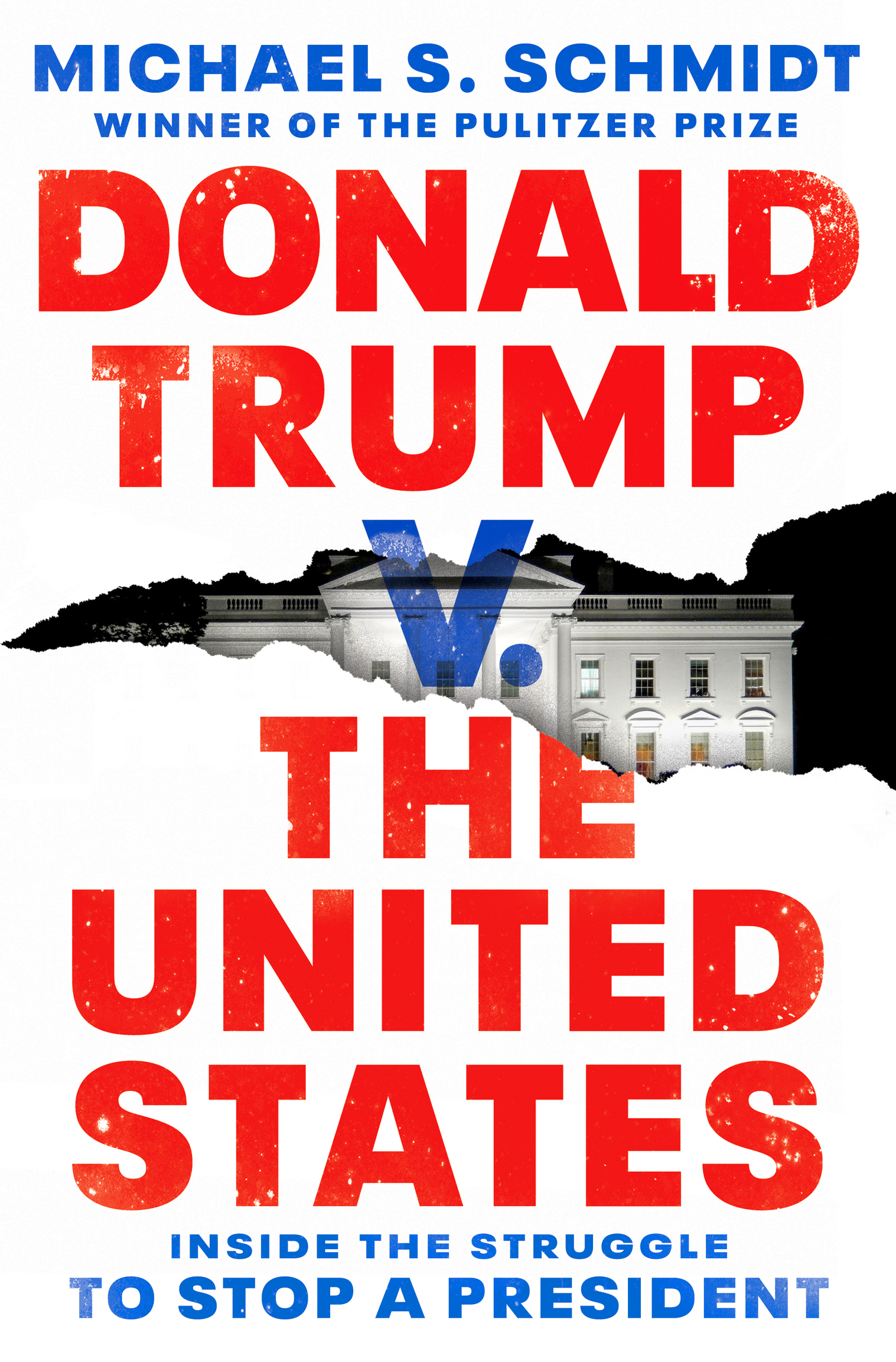
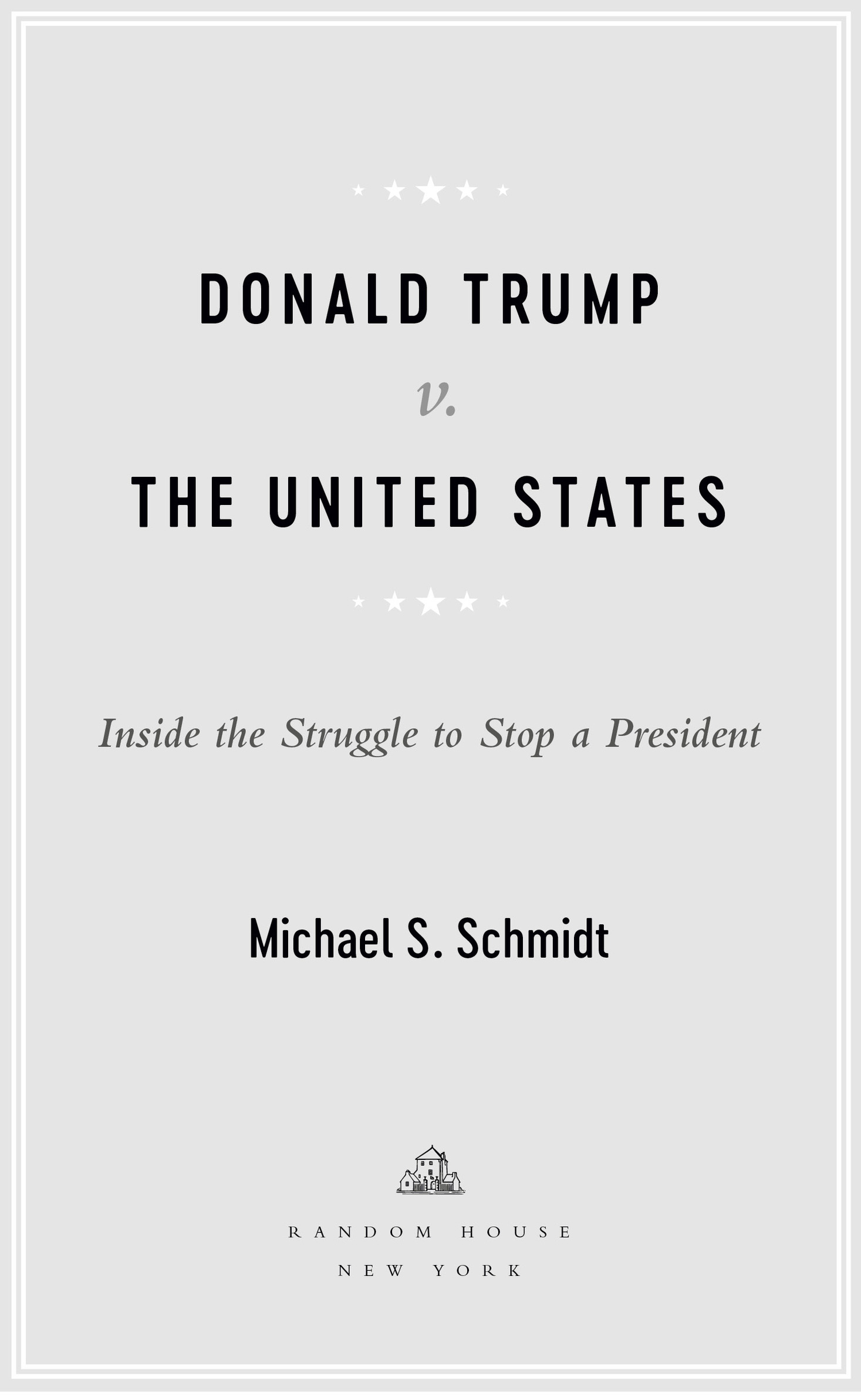
Copyright 2020 by Michael S. Schmidt
All rights reserved.
Published in the United States by Random House, an imprint and division of Penguin Random House LLC, New York.
R ANDOM H OUSE and the H OUSE colophon are registered trademarks of Penguin Random House LLC.
Hardback ISBN9781984854667
Ebook ISBN9781984854674
randomhousebooks.com
Book design by Debbie Glasserman, adapted for ebook
Cover design: Carlos Beltrn
Cover photograph: iStock/Getty Images
ep_prh_5.5.0_c0_r0
Thinkst thou that duty shall have dread to speak when power to flattery bows? To plainness honors bound when majesty falls to folly.
WILLIAM SHAKESPEARE, KING LEAR

WHEN DONALD J. TRUMP entered the Oval Office as president of the United States on January 20, 2017, he ushered in a new age of American politics. His improbable victory stemmed from an explosive collision of novelties. Trump, a political unicorn, without the experience or comportment of any previous public figure seeking high office, was propelled by a new set of forces that were taking hold inside and outside the country.
These forces had begun swirling during the Obama era, when siloed echo chambers increasingly prevented objective facts from penetrating, hardening partisan lines. Political discourse started to reflect a growing sense of grievance and conspiracy, contributing to an erosion of public trust in established institutions. At the same time, a beleaguered foreign adversary tapped into the very same fissures forming in American society to sow chaos and discord, and to undermine the integrity of the countrys democratic institutions. Vladimir Putins Russia showed that in some ways it knew America better than Americans, using the very hallmarks of democracyparticularly the free flow of informationto launch a wide-ranging attack on the 2016 presidential election, designed to bolster Trumps chances of winning the White House.
Nearly all public figures would reject this domestic divisiveness and foreign disruption. But Trump embraced these dual forces, emerging as both the outgrowth and embodiment of this new political era. His refusal to follow norms or honor tradition became a core feature of his political appeal. Trump weathered a series of campaign crises that would have ended the candidacies of anyone else. Stoking a growing tribalism and resentment among a segment of the electorate that felt ignored during the Obama years, he rode their support to the White House. By all accounts, Trumps ascension to the presidency represented one of the most extraordinary stories in our nations political history.
But the story of his rise would soon be overshadowed by what happened next. As president, Trump sought to wield power in a way so concerning to those around himhis top aides and officials in the executive branch tasked with implementing the administrations agenda and enforcing the lawthat they pursued a path rarely, if ever, seen since the countrys founding. Instead of enabling the commander in chiefs exercise of power, several sought to thwart it. These individuals undertook a mission to stop a president because they feared he could damage himself, the country, and the presidency.
In this era, with Trump now installed as commander in chief, the traditional checks on presidential power would be largely neutered. No part of the Washington establishment seemed protected from the pull of Trumps demand for loyalty to his party of one. Figures of the Washington establishment were faced with a singular question: Are you with Trump or against him? A professional bureaucracy that had historically operated outside the churn of partisan politics, keeping the gears of government turning across Democratic and Republican administrations, found itself thrust into the post-fact, hyperpartisan energy now emanating from the Oval Office. This phenomenon enveloped Congress. Trump routinely outflanked the Democratic lawmakers investigating him, and Republican leadership became Trumps public defenders. Those charged with calling balls and strikes, career civil servants and journalists, were now maligned as part of the Deep State and deemed fake news.
The place where this new force had its greatest impact was at the Justice Department and its investigative arm, the Federal Bureau of Investigation. In the forty years since the Watergate scandal, DOJ and the FBI had evolved to a point where trying to keep the perception of politics out of their work was almost as important as enforcing the law itself. Trumps unrelenting push to use the countrys law enforcement department as an appendage of his political and personal empire placed DOJ and the FBI under excruciating pressure. Some officials would seek to mollify Trump with half steps, others would outright refuse to bend, and face the consequences. All would feel the strain of the presidents demands.
For much of human history, journalists, authors, and academics have focused on how leaders, like presidents, with the help of their advisers, exert power to shape public policy, and on what that says about them, those whom they led, and the times in which they lived. Trumps exercise of presidential power is, of course, worthy of examination, even more so because he has used his power in unprecedented ways. This book covers that ground.
But, at its heart, this book is not the standard account of presidential power or a chronicle of the cabinet meetings and deliberations that animate an administrations agenda. Rather, this book tells the story of a few individuals who were compelled to confront the most powerful leader in the world, uncertain whether he was acting in the interest of the country, his ego, his family business, or Russia. Through their eyes and ears, we observe an epic struggle to restrain an unbound president.
The Trump presidency is the biggest story of our timea tall tale of brute political power and the titanic struggle atop the United States government. But it is also the most basic human story about how people, thrust into highly unusual circumstances, reacted when, under great pressure, they saw right before their eyes the president act in ways that deeply unnerved them.
You and I will almost certainly never find ourselves in the position of standing between the most powerful person in the world and the abyss, fighting to stop a president from using his power. But whether dealing with a financial hardship, a setback at work, or even just a problem at home with a child, we have all faced a trying situation in which we thought, maybe, we could overcome a challenge that might ultimately be out of our control. In the clashes between Trump and those seeking to stop him, we see, and perhaps identify with, ordinary people operating under extraordinary pressure, trying to stop something that may ultimately be beyond them.
There were several officials who stood up to Trump that I could have chosen to concentrate on. I ultimately focused on two main ones: former FBI director James B. Comey and former White House counsel Donald F. McGahn II. I chose Comey because, besides Presidents Obama and Trump, I believe Comey made the decisions that had the greatest impact on the country. His significance makes anything that illuminates his decision making essential to history. If you scored the Trump administration, there are probably peoplelike John Kellywho did more to stop Trump than McGahn did. But along with serving as a major container of Trump, McGahn did two other things that made him remarkable: He was in charge of Trumps greatest political accomplishment, and he found himself caught up as the chief witness against Trump in an investigation that posed an existential threat to the president. The arc of this book covers how Comeys decisions led directly to McGahns problems.
Font size:
Interval:
Bookmark:
Similar books «Donald Trump v. The United States: Inside the Struggle to Stop a President»
Look at similar books to Donald Trump v. The United States: Inside the Struggle to Stop a President. We have selected literature similar in name and meaning in the hope of providing readers with more options to find new, interesting, not yet read works.
Discussion, reviews of the book Donald Trump v. The United States: Inside the Struggle to Stop a President and just readers' own opinions. Leave your comments, write what you think about the work, its meaning or the main characters. Specify what exactly you liked and what you didn't like, and why you think so.

